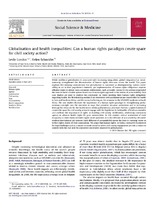| dc.contributor.author | London, Leslie | |
| dc.contributor.author | Schneider, Helen | |
| dc.date.accessioned | 2012-11-26T13:42:13Z | |
| dc.date.available | 2012-11-26T13:42:13Z | |
| dc.date.issued | 2012 | |
| dc.identifier.citation | London, L. & Schneider, H. (2012). Globalisation and health inequalities: can a human rights paradigm create space for civil society action? Social Science & Medicine, 74(1): 6-13 | en_US |
| dc.identifier.issn | 0277-9536 | |
| dc.identifier.uri | http://hdl.handle.net/10566/475 | |
| dc.description.abstract | While neoliberal globalisation is associated with increasing inequalities, global integration has simultaneously strengthened the dissemination of human rights discourse across the world. This paper explores the seeming contradiction that globalisation is conceived as disempowering nations states' ability to act in their population's interests, yet implementation of human rights obligations requires effective states to deliver socio-economic entitlements, such as health. Central to the actions required of the state to build a health system based on a human rights approach is the notion of accountability. Two case studies are used to explore the constraints on states meeting their human rights obligations regarding health, the first drawing on data from interviews with parliamentarians responsible for health in East and Southern Africa, and the second reflecting on the response to the HIV/AIDS epidemic in South Africa. The case studies illustrate the importance of a human rights paradigm in strengthening parliamentary oversight over the executive in ways that prioritise pro-poor protections and in increasing leverage for resources for the health sector within parliamentary processes. Further, a rights framework creates the space for civil society action to engage with the legislature to hold public officials accountable and confirms the importance of rights as enabling civil society mobilization, reinforcing community agency to advance health rights for poor communities. In this context, critical assessment of state incapacity to meet claims to health rights raises questions as to the diffusion of accountability rife under modern international aid systems. Such diffusion of accountability opens the door to 'cunning' states to deflect rights claims of their populations. We argue that human rights, as both a normative framework for legal challenges and as a means to create room for active civil society engagement provide a means to contest both the real and the purported constraints imposed by globalisation. | en_US |
| dc.language.iso | en | en_US |
| dc.publisher | Elsevier Ltd | en_US |
| dc.rights | This is the author postprint version of an article by Elsevier. The file may be freely used, provided that acknowledgement of the source is given. | |
| dc.subject | Human Rights | en_US |
| dc.subject | Agency | en_US |
| dc.subject | Globalisation | en_US |
| dc.subject | Civil society | en_US |
| dc.subject | State | en_US |
| dc.subject | Accountability | en_US |
| dc.subject | Health inequalities | en_US |
| dc.subject | Southern Africa | en_US |
| dc.subject | Neoliberalism | en_US |
| dc.title | Globalisation and health inequalities: can a human rights paradigm create space for civil society action? | en_US |
| dc.type | Article | en_US |
| dc.privacy.showsubmitter | false | |
| dc.status.ispeerreviewed | true | |
| dc.description.accreditation | Web of Science | en_US |

